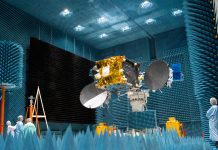The Russian attack on Ukraine has simultaneously shown the importance and vulnerability of terrestrial mobile networks and thus access to the Internet. As a result, the European Union has launched the IRIS² (Infrastructure for Resilience, Interconnectivity and Security by Satellite) program, which aims to build a satellite constellation that will provide sovereign communications capabilities in space for the EU states should provide.
The program will be financed by the EU with 2.4 billion euros until 2027. There is also funding from the European Space Agency (ESA) and private investors. The EU Commission writes that IRIS² is intended to establish space as a vector of European autonomy, a vector of connectivity and a vector of resilience.
Helsing, the European defense artificial intelligence company, has published a call for European policymakers and industry to make artificial intelligence (AI) a core requirement for the European satellite constellation program IRIS². According to Helsing, while the standards and capabilities for IRIS² are already in the final stages of decision-making, the company is pushing for adjustments to ensure the program's relevance.
IRIS² habe das Potenzial, alles zu verändern: ein vielseitiges System für zivile, staatliche und militärische Zwecke, robuste Sicherheitsvorkehrungen und ein zukunftsweisendes Design, das künftige Erweiterungen vorwegnehme, schreibt Helsing. Im Wesentlichen sei IRIS² auf dem besten Weg, Europas Lösung für eine zuverlässige Kommunikation rund um den Globus zu werden. Aber: Es fehle eine entscheidende Komponente: künstliche Intelligenz (KI). In den letzten Jahren habe die Welt jedoch gelernt, dass KI ausgereift sei und praktisch überall eingesetzt werden könne.
With AI, the huge amounts of data can be made manageable through preprocessing and analysis so that they can be sent to ground stations using the limited bandwidth required to transmit this data, Helsing's analysis is. In addition, AI methods can be used as a type of immune system to defend against cyberattacks, for example to detect sophisticated attacks and defend them in an adaptive manner. And third, AI-based anti-jamming technology could automatically counter even the most sophisticated jamming attacks.
“Sovereign communications and satellite capabilities are central to the security of European nations. The continent’s armed forces must be able to rely on SatCom connectivity to share combat information and achieve information superiority,” said former NATO Supreme Commander Transformation and current Helsing board member Denis Mercier. However, the European satellite constellation IRIS² runs the risk of becoming obsolete before it is launched, Mercier continued. “AI must be at the heart of any new satellite constellation in order to function reliably and remain relevant for years to come. Europe’s IRIS² must not start without them.”
A bidder consortium has been formed at the European level that wants to apply for the EU tender. Airbus Defense and Space, Eutelsat, Hispasat, SES and Thales Alenia Space have taken on the leading role. It is to be supplemented by Deutsche Telekom, OHB, Orange, Hisdesat, Telespazio and Thales. Together, the industrial partnership wants to create a state-of-the-art satellite constellation that is based on a multi-orbit architecture and is interoperable with the terrestrial ecosystem, writes Airbus in a statement from May of this year. The consortium will encourage start-ups, mid-caps and SMEs to join the partnership, leading to a more innovative and competitive European space sector with new business models.
Gerhard Heiming
















